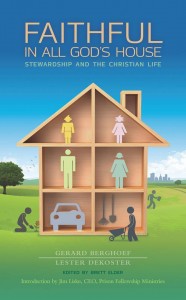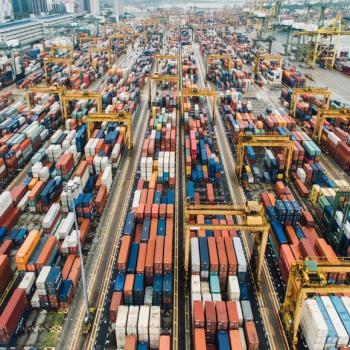Over at the IFWE blog, Elise Amyx takes a look at Brian Fikkert’s argument about the origins of the modern American welfare state:
According to Fikkert, the evangelical church’s retreat from poverty alleviation between 1900 and 1930 encouraged the welfare state to grow to its size today. Church historians refer to this era as the “Great Reversal” because the evangelical church’s shift away from the poor was so dramatic.
In Faithful in All God’s House: Stewardship and the Christian Life, Gerard Berghoef and Lester DeKoster make a similar case. They argue that “the church is largely responsible for the coming of the modern welfare community.” They also cast the hopeful vision that another “Great Reversal” might occur: “The church could be largely responsible for purging welfare of its faults and problems if enough believers caught the vision.”
While Fikkert largely draws on the early twentieth century in America for his argument, Berghoef and DeKoster examine more broadly the Christian perspective on the relationship between faith and works of charity. This dynamic is, after all, is a perennial challenge for Christian social engagement, and the interaction between the Social Gospel and evangelicalism in America is just one example. Another is the reversal over the last century or so in the Netherlands, where there has been a move from Abraham Kuyper’s claim that “all state relief for the poor is a blot on the honor of your Savior” to the Dutch church’s plea “for social security that is not charity but a right that is fully guaranteed by government.”
 Berghoef and DeKoster point to two basic ways in which the church has given birth to the modern welfare state. The first is by giving life to the idea of a welfare community in the first place:
Berghoef and DeKoster point to two basic ways in which the church has given birth to the modern welfare state. The first is by giving life to the idea of a welfare community in the first place:
…the Word that the church proclaims demands charity and justice for the poor. As this Word has permeated at least the Western world, an alerted public conscience has demanded public welfare. The church is the parent of the welfare community.
But, given that the church is made up of fallible humans, the church failed to actualize in full the demands of charity and justice that it espoused. In this way,
because the church did not, and perhaps in some respects could not, measure up to its own ideals not all the starving were fed, not all of the homeless were given shelter, and not all the oppressed and exploited were relieved. The cries of the needy ascended to heaven. The Lord answered with the welfare state.
Berghoef and DeKoster answer the question raised by Amyx, whether Christian withdrawal or government intervention came first. “The government undertakes to do what the church demands and then fails to achieve by itself,” write Berghoef and DeKoster: “Government has undertaken to do what conscience, tutored out of the Scriptures, demands but fails, through the church, entirely to achieve.”
This judgment, broadly shared by Berghoef, DeKoster, and Fikkert, coheres with Kuyper’s own judgment in 1891. After stating that state aid was a “blot” on Christ’s honor, he allowed that state action may be justified when the church fails in its obligations: “It is perfectly true that if no help is forthcoming from elsewhere the state must help. We may let no one starve from hunger as long as bread lies molding in so many cupboards. And when the state intervenes, it must do so quickly and sufficiently.”
As for the second part concerning the hopeful vision for the future, an attempt “to reverse the Great Reversal” as Amyx puts it, Berghoef and DeKoster outline real problems with the welfare state as it exists in the modern world–how the state does not intervene “quickly and sufficiently” in Kuyper’s words. But they also have some intriguing concrete suggestions about how to start to address its defects and its dominance.
They end by pointing to what the “separation of church and state” really means, and conclude: “The common good binds church and state together. What greater contribution, now, to the common good than setting the welfare system back on its feet? Try it, and see.”
From Acton PowerBlog. Images: Drumachose Presbyterian Church and Acton.













